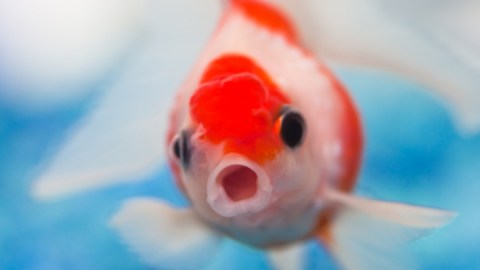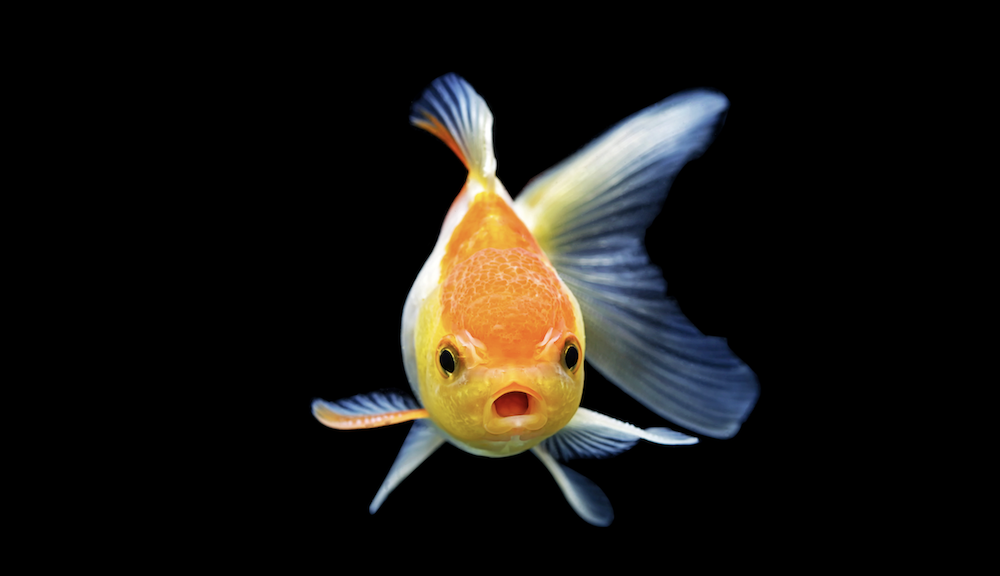Depressed Fish May Seem Like a Joke to You, But It’s Serious to Them

Dog and cat owners and animal lovers believe that animals carry some sort of human-like thought. Some may say it’s just anthropomorphizing, but we’re pretty convinced that our pets are “happy” or “sad” or whatever we want to project on them. Obviously we can’t just ask them — at least for now — but as scientists learn more and more about animal intelligence, it’s safe to say that fewer people see our companions as acting purely from instinct. Nonetheless, even some animal lovers have trouble believing that fish are self-aware and have feelings — after all, they’re as expressionless as… (most) cats. To some scientists, though, it’s become clear that fish not only have emotions, but that they’re subject to depression.
One such scientist is Julian Pittman, who is using them to develop treatments for human depression, especially since there’s some physiological overlap with us. “The neurochemistry is so similar that it’s scary,” he recently toldNew York Times. Pittman considers fish — he works with zebrafish — useful for testing the efficacy of antidepressants because it’s so easy to read their emotional state.
Pittman’s lab uses something called the “novel tank test.” When fish are introduced to a new environment such an unfamiliar tank, they’ll normally explore its upper reaches. If they’re depressed, however, they stay in the lower reaches of the new space.

Normal exploratory behavior (TROY UNIVERSITY)

Depressed behavior (TROY UNIVERSITY)
To depress fish for testing purposes, Pittman’s team gets them drunk on ethanol for two weeks before abruptly forcing them into stressful withdrawal. (It’s worth considering the ethical implications: If an animal can be depressed, many would find it morally questionable to deliberately induce a state of suffering you acknowledge is real.)
Is depression even the right word? It’s hard to say. While we can’t know for certain what this emotional state feels like to a fish — we barely know what other people really feel like — we can be reasonably sure that the behavior researchers are seeing signifies a dispiritedness, de-motivation, or at the very least, a state of demobilizing anxiety.
It’s clear that fish are far more intellectually capable than previously assumed. Conventional wisdom holds that they barely have any memory, but studies have shown this to be untrue. In experiments conducted by researchers from University of Oxford and the University of Queensland, four archerfish, a creature that shoots water to take down insect prey, were trained to expect a reward when they shot water at the picture of one of two faces. While one archerfish got it after about 30 trials; the others took longer. What’s remarkable is that when they were shown 44 images images of faces they hadn’t previous seen, they spat at the right person with up to 89% accuracy.

An archerfish (JOSH MORE)
One research group that’s been concentrating on the the capabilities of fish is the Fish Lab, led by Culum Brown, and part of the Department of Biological Sciences at Macquarie University in Sydney, Australia. The often-cited Brown has studied fish sentience and intelligence extensively, and his Fish Cognition and Behavior is now in its second printing. Research shows, he says, that, “fish perception and cognitive abilities often match or exceed other vertebrates,” adding, “fish have a high degree of behavioral plasticity and compare favorably to humans and other terrestrial vertebrates across a range of intelligence tests.”
Brown tells The Dodo, “The big issue here is that people don’t treat fish the same way as they do other animals. It’s complicated, but it boils down to the fact that most people just don’t understand them and can’t relate to them. If you don’t have that connection, you are less likely to feel any empathy.”
Even so, he lists some of the things scientists now understand about fish:
In this case, the tool is a rock against which the fish smashes clams (LABORATORY EQUIPMENT)
“Each animal is unique, has an identity and a personality. Each is special,” concludes Culum in his talk with The Dodo, so, “animals should be treated with respect, and we have a duty of care towards them that demands that we reduce pain and suffering wherever possible.”
The fish most of us have in our lives are goldfish, and New York Timesasked Penn State University’s Victoria Braithwaite what to do for if yours seems to have become lethargic and withdrawn. “One of the things we’re finding is that fish are naturally curious and seek novel things out,” and so she suggests giving your fish something new to do, maybe by moving things around in the tank or adding new objects. Brown’s research shows that fish respond well to complex tank environments, with edible plants and things to swim through. He says that such amusements decrease stress and even promote brain growth.

Tippi’s happy. Edible plants coming soon. (ROBBY BERMAN)





